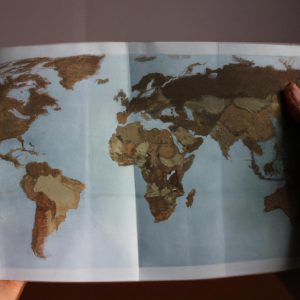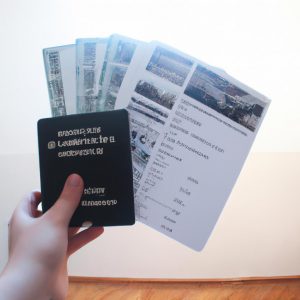Budgeting: Travel Finance Explained

Budgeting plays a crucial role in the financial management of individuals and organizations. It involves allocating resources effectively to meet specific goals and objectives. Among various areas where budgeting is essential, travel finance holds particular significance as it requires careful planning and allocation of funds for transportation, accommodation, food, entertainment, and other expenses associated with traveling. For instance, consider the case of John, a frequent traveler who often finds himself struggling financially due to poor budgeting decisions during his trips. This article aims to provide an overview of travel finance and explain how effective budgeting can help individuals make the most out of their travel experiences while maintaining financial stability.
The importance of budgeting in travel finance cannot be underestimated. Inadequate budget planning can lead to overspending or unexpected expenses that might disrupt one’s overall trip experience. By setting clear financial goals and creating a comprehensive budget plan before embarking on a journey, travelers can ensure they have sufficient funds allocated for each aspect of their trip. Properly managing transportation costs such as flights or car rentals, accommodation expenses like hotel bookings or vacation rentals, along with daily expenditures for meals and activities are all vital components that need careful consideration when developing a travel budget. Moreover, emergencies or unforeseen circumstances may arise during the trip which further further highlight the importance of budgeting in travel finance. Having a contingency fund set aside for such situations can provide peace of mind and ensure that unexpected expenses do not derail the travel plans.
Effective budgeting in travel finance involves several steps. Firstly, it is essential to determine the total amount available for the trip. This includes considering factors like income, savings, and any additional funds allocated specifically for traveling purposes. Once the total budget is established, it is important to prioritize expenses based on individual preferences and needs. For example, if accommodation is a top priority, allocating a larger portion of the budget towards hotels or vacation rentals would be appropriate. On the other hand, if experiencing local cuisine or engaging in activities is more important, ensuring sufficient funds are set aside for dining out or excursions becomes crucial.
To create a detailed travel budget, research plays a vital role. It is important to gather information on average costs associated with transportation, accommodation, meals, and activities at the chosen destination. Online resources such as travel websites or forums can provide valuable insights into pricing trends and help estimate realistic expenditure amounts. Additionally, seeking recommendations from friends or acquaintances who have previously visited the location can also offer valuable guidance.
Once all necessary information has been gathered, creating a comprehensive budget plan is recommended. This plan should include specific allocations for each expense category along with an estimation of daily spending limits. It may also be helpful to consider setting aside some extra funds for unexpected costs that may arise during the trip.
Monitoring and tracking expenses during the trip are equally important as creating a solid budget plan beforehand. Utilizing mobile applications or keeping receipts can aid in keeping track of expenditures accurately. Regularly reviewing expenses against planned budgets allows travelers to make adjustments if needed and helps maintain financial stability throughout their journey.
In conclusion, effective budgeting plays a significant role in travel finance by ensuring individuals have sufficient funds allocated for various aspects of their trips while maintaining financial stability. By setting clear financial goals, conducting thorough research, and creating a comprehensive budget plan, travelers can make the most out of their travel experiences without compromising their financial well-being. Regular monitoring and tracking of expenses further contribute to maintaining control over finances during the journey.
Understanding Your Travel Expenses
Imagine you are planning a trip to your dream destination. Let’s say you have always wanted to explore the historic streets of Rome, indulge in authentic Italian cuisine, and visit world-renowned landmarks such as the Colosseum and Vatican City. Before embarking on this adventure, it is crucial to understand your travel expenses to ensure a smooth and stress-free journey.
To begin with, let’s take a look at some common travel expenses that can affect your budget:
- Transportation: This includes airfare or train tickets to reach your destination, as well as local transportation options like buses, taxis, or rental cars once you arrive.
- Accommodation: Finding suitable lodging within your preferred price range is essential. Consider factors such as location, amenities, and reviews when selecting accommodation options.
- Food and Dining: Exploring new cuisines is undoubtedly one of the highlights of any trip. However, dining out for every meal can quickly add up. Be mindful of balancing eating out with self-catering or trying more affordable local eateries.
- Activities and Attractions: Whether it’s visiting museums, going on guided tours, or participating in outdoor activities like hiking or snorkeling; make sure to include entrance fees and potential costs associated with these experiences in your budget.
Now that we have discussed some key travel expenses let us analyze how these costs might vary depending on different destinations. The following table provides an overview of average expenses (excluding airfare) for three popular tourist destinations:
| Destination | Daily Expense ($) | Weekly Expense ($) | Monthly Expense ($) |
|---|---|---|---|
| Bali | $50 | $350 | $1,500 |
| Paris | $100 | $700 | $3,000 |
| Tokyo | $150 | $1,050 | $4,500 |
As you can see, the cost of living and travel expenses can vary significantly from one destination to another. It is crucial to research your chosen location thoroughly to have a realistic understanding of what to expect in terms of costs.
Understanding your travel expenses enables you to create a realistic budget that aligns with your financial capabilities. So let’s dive into creating a realistic travel budget tailored specifically for your needs!
Creating a Realistic Travel Budget
Once you have a clear idea of your travel goals and destination, it is crucial to understand the various expenses associated with your trip. By comprehending these costs beforehand, you can create an accurate budget that will help you manage your finances effectively throughout your journey.
Consider this hypothetical scenario: Sarah is planning a two-week vacation to Europe. She wants to visit three countries and experience different cultures, cuisines, and historical landmarks. Before embarking on her adventure, Sarah must identify the key expenses she is likely to encounter during her travels.
-
Transportation Costs:
- Flights: Research flight prices and consider any additional fees for baggage or seat selection.
- Local transportation: Determine the cost of public transportation or car rentals in each country.
- Inter-country travel: If traveling between multiple destinations within Europe, evaluate the expense of train tickets or other means of transport.
-
Accommodation Expenses:
- Hotels or hostels: Estimate the nightly rates based on location and desired amenities.
- Vacation rentals: Evaluate alternatives such as Airbnb or similar platforms for potentially lower costs.
-
Daily Living Expenditures:
- Meals and drinks: Budget for dining out at restaurants versus cooking meals yourself.
- Entertainment activities: Consider admission fees for attractions, museums, parks, etc.
- Shopping: Allocate funds for souvenirs or personal items you may wish to purchase.
-
Miscellaneous Costs:
- Travel insurance: Assess the need for coverage against unexpected events like medical emergencies or trip cancellations.
- Visa fees: Investigate if visas are required for any particular countries on your itinerary.
- Currency exchange fees: Take into account potential charges when converting money from one currency to another.
By understanding these potential expenses upfront, travelers like Sarah can make more informed financial decisions while planning their trips. Remember that actual costs may vary depending on factors such as seasonality, destination, and personal preferences. It is always wise to research and gather accurate information specific to your travel itinerary.
Prioritizing Your Travel Expenses
Building on the foundation of creating a realistic travel budget, it is crucial to prioritize your expenses effectively. By allocating funds wisely, you can ensure that your trip remains within budget while still enjoying all the experiences and adventures that await you.
To illustrate this concept further, let’s consider an example. Imagine you are planning a trip to Europe for two weeks. You have limited funds available, so making thoughtful choices about where to allocate your money becomes essential. One way to prioritize your expenses would be to identify the must-do activities or attractions in each destination and allocate a significant portion of your budget towards them.
Now, let’s explore some effective strategies for prioritizing your travel expenses:
-
Research and Plan Ahead:
- Conduct thorough research on the cost of living, transportation options, and popular attractions in each destination.
- Create a detailed itinerary outlining the main activities or sights you wish to experience.
-
Consider Personal Preferences:
- Identify what matters most to you when traveling – whether it’s exploring historical sites, indulging in local cuisine, or engaging in adventure sports.
- Allocate more resources towards these personalized experiences rather than spending on things less important to you.
-
Seek Local Insights:
- Engage with locals or fellow travelers who have visited the destinations you plan to visit.
- Their insights can help provide valuable information about hidden gems and alternative options that may be more affordable but equally fulfilling.
-
Be Flexible:
- Keep an open mind and be willing to adapt your plans as needed.
- Sometimes unexpected opportunities arise during travels that may require adjusting your initial priorities.
By following these strategies, you can make informed decisions when it comes to prioritizing how you spend your travel budget. Remember that every traveler has different preferences and interests, so tailoring your priorities accordingly will enhance the overall enjoyment of your journey.
Now equipped with knowledge on prioritizing your expenses, let’s delve into some effective tips for saving money on accommodation.
Tips for Saving Money on Accommodation
When it comes to budgeting for travel, prioritizing your expenses is crucial. By determining which aspects of your trip are most important to you and allocating funds accordingly, you can ensure that you make the most of your financial resources. Let’s consider an example: Sarah, a college student on a limited budget, plans a trip to Europe during her summer break. She must prioritize her expenses in order to manage her finances effectively.
One way to prioritize travel expenses is by focusing on the essentials first. These include transportation, accommodation, and meals. Allocating a significant portion of your budget to these core elements ensures that you have reliable means of getting around, comfortable places to stay, and enough sustenance throughout your journey. By identifying these key areas early on, you establish a foundation for planning the rest of your trip.
In addition to essential expenses, it’s also important to consider any specific activities or attractions that hold personal significance for you. This could be visiting historical landmarks or engaging in adventure sports unique to your destination. By setting aside some funds specifically for these experiences, you can create lasting memories while staying within your overall budget.
To further illustrate how prioritization works in practice, let’s take a look at the following scenario:
Prioritized Travel Expenses
- Transportation (flights, train tickets)
- Accommodation (hotel/hostel bookings)
- Meals
- Sightseeing tours/activities
By adhering to this prioritized list, individuals like Sarah can allocate their available funds more efficiently and ensure they don’t overspend on less critical aspects of their trip.
Now that we understand the importance of prioritizing travel expenses let’s explore strategies for saving money on accommodation without compromising comfort and convenience.
Strategies for Cutting Transportation Costs
When it comes to travel expenses, accommodation can often be one of the biggest budget-drainers. However, with a little planning and smart decision-making, you can significantly cut down on these costs while still enjoying comfortable stays during your trips.
One effective strategy is to consider alternative lodging options such as vacation rentals or homestays. Take for example Sarah, an avid traveler who recently visited Paris. Instead of booking a hotel room in the city center, she opted to rent an apartment through a reputable online platform. Not only did this provide her with more space and privacy, but it also saved her money compared to traditional hotels in popular tourist areas.
To further optimize your accommodation spending, here are some additional tips:
- Look for deals and discounts: Many websites offer special promotions or discounted rates for accommodations. Keep an eye out for these deals and compare prices across different platforms before making your reservation.
- Be flexible with your travel dates: Prices for accommodations can vary depending on the time of year. Consider traveling during off-peak seasons or midweek when rates tend to be lower.
- Consider shared accommodations: If you’re open to meeting new people and don’t mind sharing common spaces like kitchens or bathrooms, staying at hostels or guesthouses can be a cost-effective option.
- Utilize loyalty programs: If you frequently travel with certain hotel chains or booking platforms, sign up for their loyalty programs. These programs often provide exclusive benefits and rewards that can help you save money on future bookings.
By implementing these strategies and being mindful of your accommodation choices, you can make significant savings without compromising comfort during your travels.
Moving forward into our next section about “Strategies for Cutting Transportation Costs,” let’s explore how you can reduce expenses related to getting around during your trips while maximizing your overall travel experiences on a budget.
Maximizing Your Travel Experiences on a Budget
Having explored strategies to reduce transportation costs, let us now focus on how to maximize your travel experiences while staying within a budget. By implementing smart financial practices and making conscious decisions, you can make the most of your travel adventures without breaking the bank.
To illustrate the application of effective budgeting techniques, consider the following hypothetical scenario: Sarah, an avid traveler, plans a trip to Europe with limited funds. Despite her financial constraints, she aims to create unforgettable memories and immerse herself in diverse cultures. Through careful planning and resourceful choices, Sarah is able to have an enriching experience without overspending.
When it comes to maximizing your travel experiences on a budget, here are some key tips to keep in mind:
- Prioritize destinations based on affordability and value for money.
- Opt for off-peak seasons when prices are lower and tourist crowds are thinner.
- Research local customs and traditions beforehand to fully appreciate cultural nuances during your visit.
- Seek out affordable accommodation options such as hostels or vacation rentals instead of expensive hotels.
Consider the emotional aspects of traveling on a budget:
- Experience the thrill of discovering hidden gems that may not be part of mainstream tourist attractions.
- Connect with locals through authentic interactions, gaining insights into their way of life.
- Cultivate resilience by adapting to unforeseen circumstances that arise during travel.
- Foster personal growth by stepping outside your comfort zone and embracing new challenges.
Table (3 columns x 4 rows):
| Emotion | Benefit | |
|---|---|---|
| 1 | Excitement | Discovering unique locations beyond popular tourist spots |
| 2 | Connection | Engaging with locals and gaining cultural understanding |
| 3 | Resilience | Adapting to unexpected situations and overcoming hurdles |
| 4 | Personal Growth | Expanding horizons by embracing new experiences |
By incorporating these practices into your travel planning, you can create a fulfilling journey while adhering to financial constraints. Remember that it’s not just about the destinations but also the emotions, connections, resilience, and personal growth that make each trip truly memorable.
In summary, maximizing your travel experiences on a budget requires thoughtful decision-making and strategic choices. By prioritizing affordability, seeking unique opportunities, and embracing local culture, you can embark on journeys that leave lasting impressions without straining your finances. So go forth and explore the world with enthusiasm and savvy financial management!







